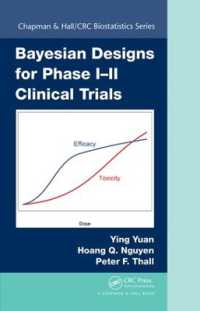- ホーム
- > 洋書
- > 英文書
- > History / World
Full Description
The Enlightenment redefined the ethics of the rights of man as part of an outlook that was based on reason, the equality of all nations and races, and man's self-determination. This led to the rise of a new language: the political language of the moderns, which spread throughout the world its message of the universality and inalienability of the rights of man, transforming previous references to subjective rights in the state of nature into an actual programme for the emancipation of man.
Ranging from the Italy of Filangieri and Beccaria to the France of Voltaire, Rousseau and Diderot, from the Scotland of Hume, Ferguson and Smith to the Germany of Lessing, Goethe and Schiller, and as far as the America of Franklin and Jefferson, Vincenzo Ferrone deals with a crucial theme of modern historiography: one that addresses the great contemporary debate on the problematic relationship between human rights and the economy, politics and justice, the rights of the individual and the rights of the community, state and religious despotism and freedom of conscience.
Contents
Acknowledgements
Preface to the English translation
Introduction: why did the Enlightenment in the Western world discover the rights of man, and what are those rights?
I. From natural law to the natural rights of the individual
Chapter 1: The historiographical debate and the discontinuity of the Enlightenment
Chapter 2: The metamorphosis of ancient natural law
Chapter 3: Modern natural law as the 'science of morality'
Chapter 4: Natural law and 'the crisis of the European mind': Jean Barbeyrac
Chapter 5: The return of Antigone: freedom of conscience and the limits of sovereignty
Chapter 6: The person as autonomous and conscious individual: John Locke
Chapter 7: From duties to rights: the Enlightenment discovery of the natural right to the pursuit of happiness
II. From natural rights to the rights of man as moral and political rights
Chapter 8: The epistemological break: Diderot and Hume
Chapter 9: The question of Rousseau
Chapter 10: The politicisation of natural rights: legislation and reform in Montesquieu, Helvétius and Beccaria
Chapter 11: The political neutralisation of rights: Wolff, Hume, Ferguson, Smith, Blackstone
Chapter 12: The Neapolitan school of natural law and the rights of man: Vico and Genovesi
Chapter 13: The new 'science of legislation' of the rights of man: Filangieri and Pagano
III. The Late Enlightenment: the rights of man and the political struggle against the Ancien régime
Chapter 14: Public opinion and the defence of man: Voltaire, Diderot and physiocracy
Chapter 15: The 'performance' of the rights of man in France between art and politics
Chapter 16: The politicisation of the Republic of Letters in Germany: freemasonry and the rights of man
Chapter 17: The Bavaria Illuminati, the rights of man and the end of the Late Enlightenment
Conclusion: towards a history of the Enlightenment and the rights of man as an unfinished project and a laboratory of modernity
Bibliography
Index








